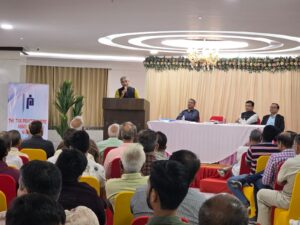GST WEEKLY UPDATE : 22/2022-23 (28.08.2022) By Vipul Khandhar

By Vipul Khandhar, CA
- GSTN enabled GSTR-9 & GSTR-9C for F.Y. 2021-22 on GST Portal:
- The Goods and Services Tax Network (“GSTN”) has enabled GSTR-9 & 9C for Financial Year (“FY”) 2021-22 for filing on the GST Portal.
- GSTR 9 – Annual Return | GSTR 9C Reconciliation Statement
- The due date for filing GSTR-9 & GSTR-9C is December 31, 2022.
- The taxpayers whose aggregate turnover in the FY 2021-22 is up to ₹2 crore have been exempted from filing annual return.
- GSTR-9 & GSTR-9C Changes & option to submit details:
GSTR-9 annual return:
- Table 4I to Table 4L have Option to fill Table 4B to Table 4E net of credit notes / debit
notes/ Amendments (+)/(-)
- Table 5D to Table 5F have an option for The registered person shall have an option to either separately report his supplies as exempted, nil rated and Non-GST supply or report consolidated information for all these three heads in the “exempted” row only.
For FY 2021-22, the registered person shall report Non-GST supply (5F) separately and shall have an option to either separately report his supplies as exempted and nil rated supply or report consolidated information for these two heads in the “exempted” row only.
- Table 5H to Table 5K have an Option to fill Table 5A to Table 5F net of credit notes / debit notes/ Amendments (+)/(-)
- Table 6B to Table 6E have a compulsory to report the breakup of inputs and input services.
- Table 6C & Table 6D have an option to either report Table 6C or Table 6D separately or report the consolidated details of Table 6C and 6D in Table 6D only.
- Table 6Ehave a compulsory to the registered person shall report the breakup of input tax credit as capital goods and have an option to either report the breakup of the remaining amount as inputs and input services or report the entire remaining amount under the “inputs” row only.
- Table 7A to Table 7H have an option to either fill his information on reversals separately in
Table 7A to 7E or report the entire amount of reversal under Table 7H only.
- Table 8A, Table 8B & Table 8D have no option to change details.
- Table 12 & Table 13 have an option for the:
- Reversal of ITC availed during previous financial year
- ITC availed for the previous financial year
- Table 15 to Table 16 have an option for:
- Particulars of Demands and Refunds
- Supplies received from Composition taxpayers, deemed supply by job worker and goods sent on approval basis
- Table 17 & 18 it shall be mandatory to report HSN code at six digits level for taxpayers having annual turnover in the preceding year above Rs. 5.00 Cr and at four digits level for all B2B supplies for taxpayers having annual turnover in the preceding year upto Rs.5.00 Cr.
- HSN wise summary of Outward Supplies
- HSN wise summary of Inward Supplies
Changes in GSTR-9C:
- Table 5B to Table 5N: Have an option to not fill this table. If there are any adjustments required to be reported then the same may be reported in Table 5O.
- Table 12B & Table 12C: have an option:
Table 12B: Any ITC which was booked in the audited Annual Financial Statement of earlier financial year(s) but availed in the ITC ledger in the financial year for which the reconciliation statement is being filed for shall be declared here.
Table 12C: Any ITC which has been booked in the audited Annual Financial Statement of the current financial year but the same has not been credited to the ITC ledger for the said financial year shall be declared here.
Table 14: This table is for reconciliation of ITC declared in the Annual Return (GSTR9) against the expenses booked in the audited Annual Financial Statement or books of account.
- The metrology act for the retail pack has been amended:
The Department of Consumer Affairs vide its press Release dated 25 August 2022 notified Legal Metrology (Packaged Commodities) (Third Amendment) Rules, 2022 to amend the Legal Metrology (Packaged Commodities) Rules 2011.
- It has exempted the garment or hosiery industry selling garment or hosiery items in loose or open,
- Now following declaration has been compulsory for the retail pack:
- Common/ generic name of the commodity.
- Net qty. in std. unit of W or M or no. of commodity in the package Unit
- Sale price Month and year of manufacture or pre-packing or import
- Best before or use by date, month and year in case of commodity becoming unfit for human consumption with time Consumer Care name & address
Name and address of the manufacturer/ marketer/ brand owner/ importer with country of origin or manufacture in case of imported products, Consumer care email id and phone number, Sizes with internationally recognizable size indicators such as S, M, L, XL, XXL and XXXL along with details in metric notation in terms of cm or m and Maximum retail price (MRP). The notification issued by the Department of Consumer Affairs is for ease of doing business by reducing compliance burden to industries without compromising the interest of consumers by declaring the information relevant to consumers.
- AAR & Judicial Decisions:
(i) Hon’ble Highcourt Decision Regarding SEIS benefit can’t be denied for not having IEC when services rendered No IEC required for availing benefit of SEIS:
(Applicant – M/s. Smarte Solutions Pvt Ltd)
The eligibility for availing benefit under the SEIS was rejected merely on technicalities. One of the conditions to avail of the benefit under the SEIS is that the service provider should have an active IEC number at the time of rendering services for which the SEIS benefit have been claimed and accordingly an IEC number was obtained before applying for the benefit of the scheme. Further that the requirement of obtaining an IEC number at the time of rendering services was not a statutory requirement.
Highcourt Held that: As per Section 7 of the FTDR Act, it does not lay down that the IEC number is essential at the time of rending services of said specified kind. The requirement of IEC number is only for taking benefits under the scheme. Therefore, it is abundant clear that the eligibility criteria of the FTP has imposed additional restriction of having IEC number at the time of rendering services which was not intent or purport of the statute. The condition is against the principal legislation and therefore, it cannot be termed as of mandatory nature for availing benefits under the scheme.
(ii) AAR On Admissibility of input tax credit on upfront lease premium:
(Applicant – Kamarajar Port Limited)
As per Section 16(1), a registered person is entitled to take credit of Input Tax charged on any supply of goods or services or both to him which are used or intended to be used in the course or furtherance of his business. Section 16(2) provides that such person will be eligible for such credit only when he is in possession of a tax invoice, has received the goods or services, paid the tax charged on such supply and has furnished the returns. Section 16(3) provides that if depreciation is claimed the ITC on the said tax component is not available. In the instant case the applicant has been allotted space by Chennai Port Trust vide Allotment Order No. LBS1/992/2020/E dated 27.04.2021 that is intended to be used by them as an extended corporate office for the accommodation of Record/Documentation Room till 31.08.2045 and in respect of the Right of use of the Asset the applicant has stated that ROU Asset that has to be capitalized, amounts to Rs.5,39,21,553/- including the initial direct cost, if any incurred by them. It is seen from the tax invoice furnished by the applicant that the license fee paid amounts to Rs.5,39,21,553/- which is the taxable value and GST is levied only on the taxable value. Thus on reading of the above statue and applying to the case at hand it is seen that input tax credit can be claimed on the upfront lease premium which is paid for the allotted covered space used as an extended corporate office as it is in the course of business.
The State Jurisdictional authority has stated that input tax credit is ineligible in the instant case under Section 17(5) (d) of the CGST Act, 2017.
From the above provisions it is seen that in respect of immovable property the Credit of tax paid on goods or services received on own account, for construction of immovable property is available only when such immovable property is a ‘Plant and Machinery’. In the instant case the contract is a lease contract of the built-building for use as an extended corporate office for accommodation of record & as documentation room and it is for the business purpose of the applicant. The lease allotment letter do not spell of lease for any construction activity on the closed space leased for business purposes. Hence, the upfront premium made is the lease rentals as per the allotment order/letter of Chennai Port Trusts and it is nothing but lease rentals paid for the services of ‘Renting of Immovable property’ for business purpose. From the material on record, we observe that the upfront premium paid is not related to any construction activity of such covered space but against the rental value for the period of rent calculated for the period of lease and collected upfront. Thus, provisions of Section 17(5) (d) is not applicable to the instant case. To sum up, the issue relates to the eligibility to ITC of Tax paid on the upfront lease rent paid by the applicant which is consideration towards the space rented by them from Chennai Port Trust. As discussed above the provisions of Section 17(5)(d) is not attracted to the activity of ‘renting Immovable Property Services’. Therefore, the credit of tax paid on the upfront lease rent by the applicant is available subject to fulfilment of other conditions set out under Section 16 of the Act.
Disclaimer:
This publication contains information for general guidance only. It is not intended to address the circumstances of any particular individual or entity. Although the best of endeavour has been made to provide the provisions in a simpler and accurate form, there is no substitute to detailed research with regard to the specific situation of a particular individual or entity. We do not accept any responsibility for loss incurred by any person for acting or refraining to act as a result of any matter in this publication.




